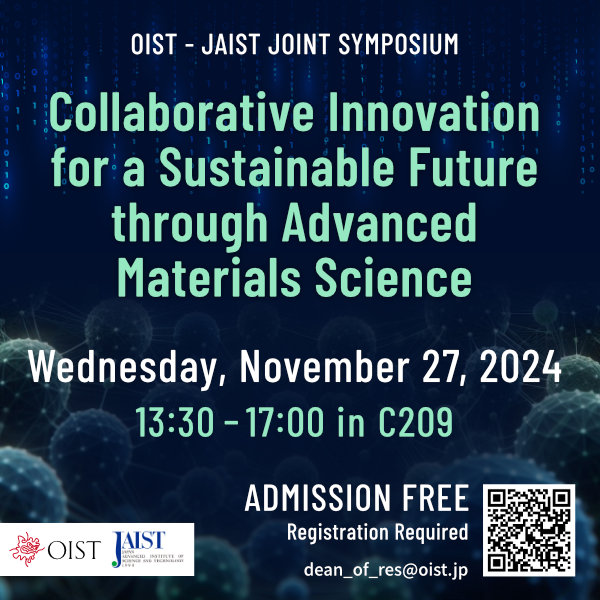OIST-JAIST Joint Symposium: "Collaborative Innovation for Sustainable Future through Advanced Materials Science"

Description
Registration
Pre-registration has closed.
If you would like to attend, please come directly to the venue and ask at the reception desk. Thank you.
Title
"Collaborative Innovation for Sustainable Future through Advanced Materials Science"
Symposium Abstract
OIST and JAIST entered into a Memorandum of Understanding (MOU) last year. As part of our collaborative efforts in research, both universities have agreed to leverage each other's strengths through cooperation. To commemorate the first anniversary of the MOU signing, a celebratory event will be held at OIST on November 27th.
Program
Please download the program HERE.
*The program is subject to change.
OIST Speakers
| 1 |
Dr. Tadashi Yamamoto Professor |
Development of a New Methodology of Cancer Chemotherapy The advancement of cancer research and treatment modalities has resulted in a reduction in mortality rates associated with numerous cancer types. However, the prognosis for fibrotic cancers, such as pancreatic cancer, remains poor, and no effective treatments have been developed. In collaboration with Kensuke Osada at the National Institute for Quantum Science and Technology, we have devised a novel strategy to enhance the efficacy of chemotherapy. This strategy involves the delivery of the anti-apoptotic gene-silencing siRNA to cancer cells using the uPIC nanoparticle, which is capable of penetrating the stroma. Pilot experiments have yielded promising results in a model with a highly developed stroma. |
|
| 2 |
Dr. Christine Luscombe Professor |
pi-Conjugated Polymers Unit |
Dual-catalytic Reactions to Promote Previously Inaccessible Reactions Dual-catalytic systems offer a transformative approach to facilitating previously inaccessible chemical reactions. By combining two distinct catalytic processes, these systems enable synergistic interactions that promote new reactivity pathways, leading to increased efficiency and selectivity in organic synthesis. In our group, we have been exploring the applicability of these reactions in semiconducting polymer syntheses and have been able to achieve controlled direct arylation polymerizations, room temperature reactions, and cross dehydrogenative reactions. These reactions could not be achieved using a single catalyst and highlight the utility of such systems. In this presentation, the achievements made will be discussed while also addressing the challenges that remain. |
JAIST Speakers
| 3 |
Dr. Motoichi Kurisawa Professor |
Research Center for Exponential Biomedical DX |
Enhancing Healing Power with Green Tea Nanomedicine for the Treatment of Intractable Diseases We have developed innovative drug delivery systems that enhance therapeutic efficacy through synergistic effects with their carried drugs. Our micellar nanocomplexes (MNCs), composed of epigallocatechin-gallate (EGCG) derivatives, exhibit significantly enhanced therapeutic properties, such as antioxidant and anticancer effects, compared to pure EGCG, a principal component of green tea. The MNCs loaded with anticancer drugs demonstrate improved tumor selectivity, extended blood circulation time, and more effective reduction in tumor growth compared to the free drug. This MNC represents a novel and efficient drug delivery system, leveraging the therapeutic potential of a green tea-based carrier. |
| 4 |
Dr. Toshiaki Taniike Professor, |
International Research Center for Materials Informatics |
Streamlining Materials Discovery by High-Throughput Experimentation and Machine Learning Materials informatics (MI) applies data science techniques to materials science, and its potential has been explored across numerous fields. However, successful application of data-driven approaches requires datasets that are sufficient in size, distribution, and consistency. A key challenge in MI is the scarcity of datasets suitable for machine learning. To address this, our research group employs high-throughput experimentation, from synthesis to evaluation, to generate high-quality and large-scale datasets. By integrating machine learning techniques, including advanced automatic feature engineering, we uncover robust hypotheses that significantly enhance the materials discovery process. |
Co-hosts
Contact
Please email dean_of_res@oist.jp if you have any questions.
Event News
【OIST】-Event Report- Exploring the Future of Innovation and Collaboration between OIST and JAIST
【JAIST】-Event Report- OIST-JAIST Joint Symposiumを開催
Add Event to My Calendar
Subscribe to the OIST Calendar
See OIST events in your calendar app





